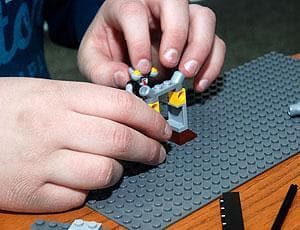Advertisement
Parents Divided By The Medication Debate
ResumeMassachusetts has more children’s mental health providers than most other states, routinely screens most children for mental health issues, and has Rosie D., the 2006 lawsuit that mandates adequate mental health services for kids on public health insurance. But several challenges remain.
In the second report of our week-long series, “Are The Kids All Right?,” we visit two local families who've taken divergent paths on whether to give their kids mental health medication.
The Donovan Family Chooses Not To Medicate: (For the other side of the debate, meet the Brennan family.)
[soundslide]http://www.wbur.org/files/soundslides/2011/wbur_0131_deborah-donovan[/soundslide]
BOSTON — Giving a child drugs to manage a mental illness is a difficult, personal decision. Here are two families who’ve struggled with it, and made different choices.
Liz Moore is a mother of four who lives outside Boston. Her 9-year-old daughter started showing signs of problems in kindergarten.
"Sometimes in class she would isolate herself," Moore said. "She hid under a table. Sometimes she would hit her head against the wall. She saw herself negatively."
In another town outside Boston, Deb Donovan was dealing with her 5-year-old son and his violent outbursts.
"You want to know if this is going to help Johnny develop into an adult who has a sense of self-worth and competence in the world. And we have no idea whether that is the case or not."
Dr. John Abramson, author of 'Overdosed America'
"I’ve had the police come to my house," Donovan said, referencing a statement her son made as a kindergartner on the playground.
Both women faced a choice that thousands of people in Massachusetts face every day: could medicine help my child’s behavior? It’s an extremely important choice for a parent to make, says Dr. John Abramson, a lecturer at Harvard Medical School and author of “Overdosed America.” Abramson says giving children medicine has a lot of unanswered questions.
"What we don’t know, what nobody knows, is what the long-term effect of that is," Abramson said. "And as a parent that’s the real question we want to be asking. Not: 'Will this help Johnny get through the third grade better?' You want to know if this is going to help Johnny develop into an adult who has a sense of self-worth and competence in the world. And we have no idea whether that is the case or not."
Even though we don’t know, nationally it’s estimated that 10 percent of kids ages 5-18 are medicated for behavioral disorders. That’s more than any other country in the world.
So what did Moore and Donovan do? Moore’s daughter was diagnosed with a mood disorder and she put her on mood-stabilizer drugs and an anti-depressant.
"After the medication she was able to focus better in school," Moore said, "her moods were more stable (and) she didn’t get into those depressive episodes."
Donovan, whose son has a complicated diagnosis of attention deficit disorder and some anxiety, briefly tried Ritalin, a stimulant. After a week, she took him off because he was cycling through bouts of extreme hyperactivity and then crashing into exhaustion. Instead, Donovan changed his environment. She put him in a private therapeutic school, altered his diet and put him in therapy.

"The things that have made the biggest difference have kept him who he is and brought out the best in him without having to chemically modify him," Donovan said.
Two choices. They were made after extensive consultations with doctors, family and friends going through the same thing. But what these parents may not realize is that part of their decision-making may have been affected by larger forces, such as social pressure, marketing and poor diagnosis.
Dr. Gary Sachs says that when the diagnosis is right, research shows drugs work well. Sachs is the founding director of the bipolar clinic and research program at Massachusetts General Hospital.
"You respond to treatment for a disorder much better if you really have that disorder," Sachs said.
Sachs says it’s not about whether we are prescribing the right amount of drugs to kids, but whether they are being correctly diagnosed at all.
"It’s at least three times as much evaluation time requirement I think to see the situation clearly as it is with adults," Sachs said.
That's because you need to talk with parents, teachers and pediatricians to get a full picture. And that’s something insurance companies don’t pay doctors for, Sachs says, so diagnoses are often rushed.
[sidebar title="Mental Health Resources:" width="300" align="right"]
Links for families (for more detail):
- Mass. Family Ties resource directory
- A mental health parents' how-to-guide
- Federation for Children with Special Needs
- SPED parent basic toolkit
- Navigating the Mass. Special Ed. System
- Mood and Anxiety Disorders Institute
- Parent/Professional Advocacy League
- Mental Health Legal Advisors Committee
- National Alliance on Mental Illness
- AdolescentWellness.org
- Apply for Mental Health Services (PDF)
- Massachusetts Child Psychiatry Access Project
[/sidebar]
"We end up with a 'name that tune' kind of approach to diagnosis, which is often misleading," he concluded.
But parent Moore, who is a psychiatric nurse, says she’s confident her daughter was correctly diagnosed.
"I guess I have an advantage knowing what the signs of a person with mood disorder are, but she’s been having mood swings since she was very young," Moore said.
Mood swings in children are nothing new, says Robert Whitaker, a medical journalist who wrote, “Anatomy of an Epidemic.” But 20 years ago, children with behavioral problems were rarely medicated. Just in the past 15 years, there’s been a 40-fold increase in the diagnosis of bipolar in children. But Whitaker says there’s little research behind the increase.
"There was no biological discovery of a marker of depression in children," Whitaker said.
Instead, Whitaker and others see a pharmaceutical marketing story as to why the prescribing of antidepressants to children took off in the early 1990s.
"The adult market is seen as saturated and it’s quite clear that they were looking for expanded markets and they started seeing we realize it’s an unrecognized problem," Whitaker said.
Drug companies target doctors, says Harvard's Abramson. The companies give out research grants, fund top academics and pay consultants.
"Virtually all the information about psychopathology that is treated by drugs in kids comes from drug companies," Abramson said.
PhRMA, the lobbying group for leading pharmaceutical companies, says it supports more research on the use of medicines in pediatric patients. The National Institute of Mental Health says most medications used to treat young people are safe and effective. However, many of them have not been studied or approved for use with children but are still being prescribed. In a study by a Massachusetts advocacy group for kids with mental illness, the majority of families said they were very satisfied with medications for their kids because they worked.

Parents say there were not influenced by drug company ads, but they did listen to the experiences of other family members.
But there’s also peer pressure for medication. Donovan experienced it when her son was acting out at school.
"The message came across, and this is verbatim," Donovan recalled, "that I was 'being an irresponsible parent by not medicating my child.' "
And Dr. Greg Hagan, president of the Massachusetts Chapter of the Academy of Pediatrics, is concerned about kids who are in difficult homes and are pressured to be put on medication.
"That’s where I worry," Hagan said. "I worry that kids are being medicated for social problems that are not of their making, and they may get to the point. It seems sad to me that we can’t intervene earlier for those kids."
But Hagan also thinks there are lots of kids with attention deficit disorder not getting the medicines that would greatly help them. As for Moore, she wouldn’t consider taking her daughter off mood-stabilizing drugs because she’s better able to focus and make friends.
"I think it would be damaging to her not to be on medication right now," Moore said.
Donovan says without drugs her son has transformed from a child who was explosive and aggressive to one who is calm, confident and expresses his creativity with the electric piano. Donovan says she knows "this is the best decision that I’ve ever made for my son."
Two families, two choices about how to treat children with mental illness.
This program aired on February 1, 2011.